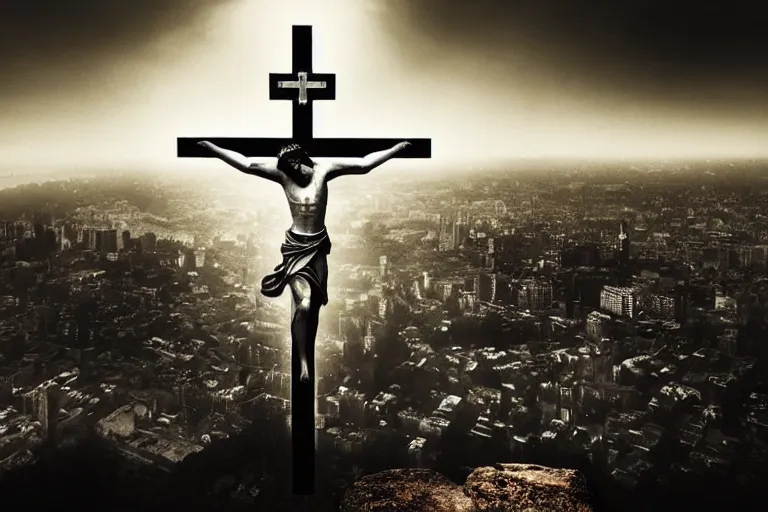Explore the religious, historical, and cultural aspects of Good Friday.
Good Friday is a significant day in Christianity, marking the crucifixion and death of Jesus Christ. In this article, we delve into the meaning behind this holy day, its origins, and its impact on Christians worldwide.
The Historical Significance of Good Friday
Imagine stepping back two millennia to ancient Jerusalem, where the world’s history took a dramatic turn on Good Friday. The events leading up to Jesus’ crucifixion are both tragic and pivotal, shaping not only Christian tradition but also influencing human culture for centuries. Why did these few days become so profoundly significant? Could it be that what transpired then was more than just a local incident; could it have ramifications on the very fabric of humanity’s moral and spiritual landscape?
The narrative begins with a feast, a Last Supper shared between Jesus and his disciples, symbolizing the establishment of a new covenant. Was this meal merely a farewell or did it hold deeper meanings that would unfold within days? The Passion of Christ, as it’s often called, is a story of betrayal, denial, and suffering. The arrest in Gethsemane, the trial by religious and civil authorities, and finally the scourging and crucifixion—all these events are etched into history with such detail that they almost feel like a play performed on the grandest stage.
Historically, Good Friday marks the day of the Crucifixion of Jesus Christ, which Christians believe fulfills prophecies found in the Old Testament. The cross becomes more than just an instrument of death; it transforms into a symbol of love and sacrifice. How can we truly grasp the weight of Jesus’ sacrifice, especially when we see the brutality of his execution? It’s a question that echoes through time, challenging our understanding of divine compassion and human cruelty.
The events leading up to Good Friday, from Jesus’ anointing in Bethany to His final words on the cross, are rich with symbolism. The palm branches carried by the crowd, the mocking at Golgotha, even the darkness that fell upon the land—all serve as metaphors for different aspects of humanity’s relationship with God and each other. How do these symbols resonate in our modern world, serving as reminders or warnings?
As we delve into the historical significance of Good Friday, we find ourselves not just recounting a past event but connecting to a living tradition that continues to shape beliefs, inspire art, and influence society today. The crucifixion is more than an ancient story—it’s a timeless tale of redemption, forgiveness, and the enduring power of love in the face of injustice.
The Religious Aspects of Good Friday
Imagine walking through the streets of Jerusalem 2,000 years ago on that fateful Friday. The air was thick with tension and fear, a palpable weight hanging over the city like a heavy shroud. Could you hear the echoes of ‘Crucify Him!’? The cries rang out not just from one voice but from many, creating an almost deafening symphony of despair. Was this just another political upheaval, or did it signify something much deeper, something profound that would change history forever?
Good Friday is more than a historical event; it’s a day steeped in religious ritual and symbolism. The religious significance of Good Friday lies in the practices, symbols, and rituals that Christians engage in to commemorate the crucifixion of Jesus Christ. For many, this day brings a sense of profound sorrow and reflection, a poignant reminder of the price paid for our salvation.
The stations of the cross, for instance, are a powerful devotional practice where participants walk through 14 stations representing key moments in Jesus’ last journey. Each station is a metaphorical journey, not just physically but spiritually, inviting believers to reflect on their own faith and struggles.
The via crucis (Way of the Cross) procession, often held in churches or outdoors, allows communities to come together in shared grief and celebration. Carrying a cross symbolizes the burden of sin that Christ took upon Himself. This act is not just symbolic; it’s an active participation in the story of redemption.
The crucifix, with its central image of Jesus on the cross, serves as a constant reminder of His sacrifice. Churches often display these crucifixes prominently during Good Friday services, drawing worshippers into a moment of profound contemplation and prayer. It’s a visual representation of what faith means—embracing suffering for a greater good.
Through these rituals and practices, Christians find a way to connect with the historical events of that day, making it real in their spiritual lives rather than just an ancient story. It’s a call to remember the ultimate act of love and sacrifice, inviting us all to consider our own roles in spreading the message of hope and grace.
The Cultural Impact of Good Friday
Imagine walking through the bustling streets of Rome on Good Friday, where centuries-old traditions intertwine with modern celebrations. How does it feel to witness the sorrow and reverence that transforms a typical city into a living tribute to one of Christianity’s most profound days? In Jerusalem, pilgrims follow the exact path believed to have been walked by Jesus Christ, from his trial to crucifixion. Is there any wonder why this journey holds such deep significance for believers?
In Spain, processions known as “Pasos” are carried out through towns and cities, with statues of Jesus’ suffering paraded through the streets amidst tearful participants. How can one not be moved by the collective grief and piety that defines these events? These traditions serve as a powerful reminder of the cultural impact of Good Friday beyond just its religious significance.
In the United States, many communities hold communal vigils, where Christians gather to reflect on the sacrifice made by Jesus. These gatherings often include prayers, hymns, and sermons that emphasize themes of forgiveness and redemption. How does participating in such a vigil resonate with your personal beliefs about faith and human suffering?
The cultural significance of Good Friday extends far beyond its religious aspects; it is a day deeply ingrained in the identity and traditions of many communities. From the solemn processions to the quiet vigils, each celebration captures a piece of the broader tapestry that makes up Christian culture.
The Biblical Account of Good Friday
Imagine standing on Golgotha, the hill where Jesus Christ was crucified, on that fateful day known as Good Friday. The air is heavy with tension and sorrow, yet it carries whispers of redemption and hope. In the Bible, these events are meticulously detailed, painting a vivid picture of one of the most profound moments in human history.
According to Matthew 27, Jesus was led by Pilate to be crucified after being falsely accused. The narrative describes how he was stripped naked and nailed to the cross with two thieves. The weight of his hands and feet, each pierced through with iron nails, anchored him to the wooden beam. The pain must have been unimaginable, yet the Gospel accounts remind us that Jesus accepted this suffering willingly for our sake.
The journey from Pilate’s judgment hall to Golgotha was a symbolic procession of humanity’s fall and redemption. Along the way, Simon of Cyrene was forced to carry the cross for Jesus. This act symbolizes how we all bear the burden of sin but find relief when Christ takes on that weight.
As the day progressed, darkness covered the land from noon until three in the afternoon—a stark reminder of God’s sorrow and the world’s condemnation. During this time, Mark 15 notes that Jesus cried out with a loud voice: ‘My God, My God, why hast Thou forsaken Me?’ This cry is a profound moment that questions the depth of His humanity and the magnitude of His sacrifice.
The events on Good Friday are not just historical accounts; they are a testament to divine love. As Jesus breathed his last breath on the cross, the Bible states that the veil of the temple was torn in two from top to bottom, signifying the breaking down of barriers between God and humanity through Christ’s sacrifice.
Understanding these events helps us grasp the true meaning of Good Friday—it is a day that encapsulates not just suffering but also redemption, forgiveness, and eternal life. It invites us to reflect on our own lives, asking where we stand in relation to this profound event that changed history forever.
The Symbolism of Good Friday
The Symbolism of Good Friday: Explore the symbolic meaning behind the events of Good Friday and their significance in Christian theology.
Imagine the cross as a canvas, painted by divine hands, on which the greatest act of love is etched. What does it mean when Jesus, our savior, chooses to be crucified? Is it just another form of punishment, or does it hold deeper symbolism?
In Christian theology, Good Friday isn’t merely a day of mourning; it’s a profound expression of the love and sacrifice that defines the relationship between God and humanity. The symbolism here is as complex as it is profound: Jesus’ crucifixion serves as a pivotal moment where the divine and human realms intersect, offering redemption to all who seek forgiveness.
Consider this: if the crucifixion were just an ordinary event, its impact on history would be minimal. But when we see it through the lens of faith, the significance blossoms into a narrative of hope, suffering, and ultimate victory over death. This act of sacrifice is more than a historical fact; it’s a powerful symbol that challenges us to reflect on our own lives and the choices we make.
The cross becomes a beacon in a dark world, a reminder that even in the face of overwhelming pain and injustice, there is light—a light of love so great it can overcome any form of evil. It’s like walking into a tunnel where the darkness seems endless, but then a beam of hope pierces through, illuminating your path to salvation.
As we ponder the symbolism of Good Friday, we are invited to contemplate our own lives: How do we carry our crosses? What sacrifices have we made for love and what have we missed out on because of fear or apathy? The sacrament of Good Friday is not just a memorial; it’s an invitation to live authentically, with purpose and compassion.
In the end, the true meaning of Good Friday lies in the transformational power of love. It teaches us that even the most painful experiences can lead to profound growth and redemption. So, as we reflect on this day, let us embrace its symbolism and allow it to guide our hearts towards a deeper understanding of God’s unconditional love for humanity.
The Legacy of Good Friday
Have you ever pondered the profound impact that Good Friday has had on Christianity? It’s more than just a single day marked by somber reflection; it’s a legacy that echoes through centuries, shaping not only religious beliefs but also moral codes and societal norms. Imagine if every Christian community was merely a fleeting gathering without the deep-rooted traditions of Good Friday. What would be left?
Good Friday isn’t just about remembering a historical event—it’s about understanding the very foundation of faith itself. By commemorating Jesus Christ’s crucifixion, Christians are reminded of their own mortality and the ultimate sacrifice made for humanity’s salvation. This day serves as a powerful reminder that love, even in its most painful form, can change the world.
Consider how Good Friday has influenced Christian art and architecture over the centuries. From intricate carvings depicting the Passion of Christ to grand cathedrals designed with crucifixes prominently displayed, these symbols have become more than just visual representations—they are lifelines connecting past generations to their faith.
The rituals associated with Good Friday today—such as the Stations of the Cross or the blessing of palms on Palm Sunday—are not mere traditions. They are living testaments that ensure the story of Christ’s sacrifice remains alive, guiding believers through their spiritual journeys and offering solace during times of personal struggle.
Moreover, the significance of Good Friday extends beyond religious boundaries. Its message of forgiveness, mercy, and redemption resonates with people from all walks of life. In a world often marred by divisions and conflicts, this day serves as a poignant reminder that no matter how dark our past or present may seem, there is always hope for healing and renewal.
In essence, Good Friday’s legacy lies in its ability to transform personal beliefs into collective actions, fostering empathy and compassion among believers. As we stand together during this solemn observance, let us not just remember the events of long ago but also reaffirm our commitment to living out Christ’s teachings in every aspect of our lives.
Reflect on your own role in carrying forward this sacred tradition. How can you make a difference today, inspired by the profound sacrifice made on that fateful Friday?
In doing so, we honor not just the past but also build a better future—one where love and forgiveness continue to flourish.
Conclusion
 By understanding the significance of Good Friday, we gain a deeper appreciation for the Christian faith and the sacrifices made by Jesus Christ. This knowledge can inspire us to live more compassionate and selfless lives.
By understanding the significance of Good Friday, we gain a deeper appreciation for the Christian faith and the sacrifices made by Jesus Christ. This knowledge can inspire us to live more compassionate and selfless lives.











